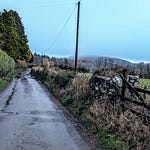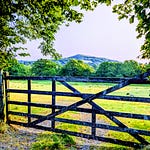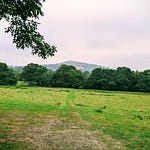“This ridiculous object has been strutting around saying I this and I that and all the while it has no more I than a scarecrow and no more will than a puppet.”
― Robert S. de Ropp, The Master Game: Pathways to Higher Consciousness
There are two worlds.
The as if world and the as is world.
This isn’t my description but something I first heard Douglas Harding talk about in one of his many talks.
Let me briefly explain.
as if world
This world is dualistic.
It’s exclusively based on language (whatever your native tongue). Apparently, it describes the thing we believe it represents. A hand is a hand; a car is a car. And a thought, feeling, emotion etc. is a definite thing.
We try desperately to control this world and believe that we’re controlled, at least to an extent, by external but unseen forces. “I’m stressed” is ordinarily taken to mean something external to me is making me this way or is certainly affecting my mood.
We argue with reality and lose every time.
[If you disagree with any of this, please let me know.]
as is world
This is our natural state.
Think of a baby or a very small child. They’re lost in the reverie of the moment. Likewise, we understand that what we describe as first person singular is not known and/or indescribable and whatever is arising is arising and we’re not in charge of any it.
Words aren’t apt to describe anything. We know that they’re simply a way to navigate the world. If we want to ask for a glass of water, we do. But we only know this and do this because we’ve been trained and/or indoctrinated this way.
We’re not somnambulists, fatalists or in the waking sleep mode described by Gurdjieff and others.
Everything just is — however paltry that might sound.
[Ditto my comment above. If you think this something other than what I’ve described, please let me know.]
On first blush, you might not see any difference between the two worlds and together they’re part of the full catastrophe we call living. Possibly, but I don’t think so. In fact, I’d go further and say that the inherent problem is that no one or at least very few people ever question the first person singular around which their whole life revolves. You know the drill:
I am this, that or the other thing.
Oh, really.
What is this ‘I’ that you cleave to with all your might?
No, dear reader that’s a serious, serious question. It might not seem that way but until we’re willing to question who or what we are from our direct experience and not how others or society has defined us, we’ll continue to be trapped in the as if world where, in essence, we argue constantly with what is happening and think we’re in charge or at least want to be.
I recognise the tension of what I’m describing, namely, when your dualistic world is all you’ve ever known and you’ve been told that you’re the Boss of your life, it’s hard to accept — not impossible mind you — that you’ve overlooked the most obvious thing in the world, i.e. your true nature.
I suspect, though, you’re deeply sceptical of this. For a start, if you can get your ducks in a row so that your life is, if not blissful, a little better than bearable why would you have any need to go running off looking for some mythical, ineffable I am? You wouldn’t. Moreover, particularly if you’re apt to come out in a rash when anyone mentions spirituality or faith or any other dogma, you’re likely to run for the hills. Trust me, as a hard-headed, literalist lawyer I understand where you’re coming from.
But then again, if you’re in the midst of another existential or any other crisis or you’re out of whack with a world intent on squeezing the living daylights out your soul, then you might feel drawn to explore something practical and very helpful that is apt to do something more than assuage your concerns with how your life has turned out.
That’s not me offering any certainty in any sense of the word, but, and it’s an important but, you might find that if you’re willing to question the regnant labels, built around the first person singular, and engage in a few of the experiments set out in Douglas Harding’s extraordinary book, On Having No Head, suddenly and unexpectantly, you’ll begin to see the world — your world — anew.
For me, as someone who’s having to pick up the work again, I find in explaining things to friends and family, the best place to start is the pointing experiment. I’ve already shared a video where Richard Lang demonstrates this but here is a brief set of instructions that should make you think about something you’ve taken as read all these years — i.e. you see the world through two tiny peepholes out of an ageing meatball (your head) supposedly containing your thinking self and I assume that mythical ‘I’.
Take your finger, lift it up and point outwards ahead of you at an object, the wall or the ceiling. Describe the thing you see.
Next, do the same in pointing to what you call your feet.
Do the same with your knee, stomach and finally your chest area.
Once you’ve done that and you know or believe you have been pointing at a series of things, then turn your finger so that it is pointing directly to the place where you believe your face to be. What do you see?
Please describe that from your actual experience and not what you’ve been told by others or you’ve seen previously in a mirror.
I see no face; and I’m headless. And the space is wide open, a void if you like, and yet it takes in everything through one unlimited aperture. You might then ask what am I at zero distance to myself? Think of it like this. If I went up to you with a camera and kept on going, I’d quickly lose focus and then I’d be down to cells, molecules and atoms and then, well, who knows?
Yes you say but what’s this got to do with reality?
What reality?
The one that says you’re a terminal case, defined by others and constantly at war with some imaginary foe?
For me, it’s not so much liberating as it’s changed my world forever, much in the same way that the Heart Sutra did all those years ago.
Again, you say but it all sounds too simple. It is but that doesn’t make it any less profound.
Put it another way, we’re never asked to investigate who we are from our direct experience. In short, to pay attention to what’s happening now when we look out on our assumed world. That means we take as read what we’ve been told about who we are and how to navigate this VUCA world. But of course, when you’ve carved everything up into a series of zeroes and ones, it’s very hard to see that we’re essentially gifted or is that blessed to operate from a place of pure love, bliss or oneness.
I realise that that language is out of step with our materialistic, go-getter world where it’s all about perspiration, grit and perseverance but as someone who has acquired a slew of trophies in that department and plenty of war stories to boot, I stand testament to the fact that the effect you’re seeking — I assume solemnity, peace and equanimity — can be found, but it usually if not always disappears as quickly as it arrives. I can’t be universal in my observation but, certainly, I’ve never yet found someone who can attest to finding inner peace on the back of another get-better programme.
In the end, though, as I too often say, you’re either drawn to Self-enquiry or you’re not and nothing I say will or even should make a happeth of difference. There again, I hate to feel you’ve come to the end of the road and only then are you willing to throw existential caution to the wind in the hope of finding an inner sanctuary to help you navigate the travails of life. Of course, if you think I can help or you’d like me to speak further on the subject of our true nature, I’d be delighted to do so.
Thank you for listening to me read this post and I’d love to get your feedback as to whether you prefer it to the written newsletter.
Blessings,
Julian
Photo by Marek Piwnicki on Unsplash











